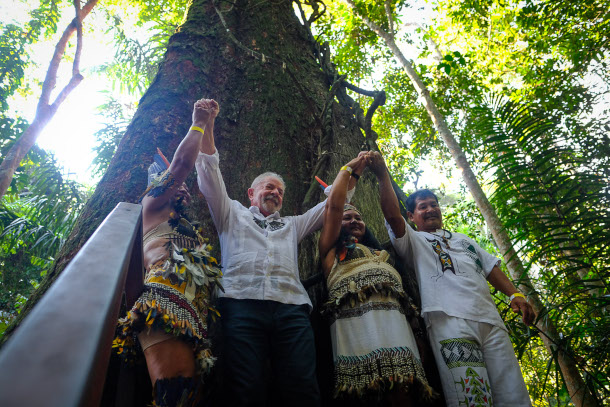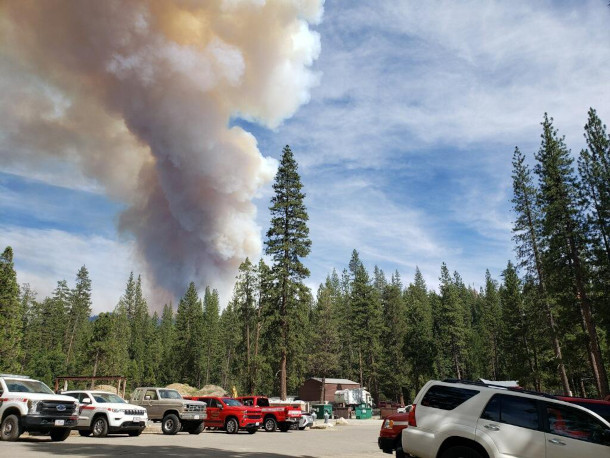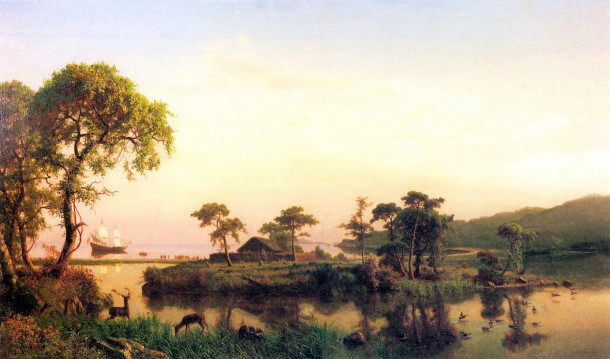Beyond the Headlines
Air Date: Week of May 12, 2023

Brazilian President Luiz Inácio Lula da Silva has set aside six new Indigenous reserves in the Amazon rainforest, restricting logging and mining on 1.5 million acres. (Photo: Alberto César Araújo, Amazônia Real, Flickr, CC BY-NC-ND 2.0)
This week, Living on Earth Contributor Peter Dykstra joins Host Steve Curwood to discuss new Indigenous reserves in the Brazilian Amazon totaling a million and a half acres. They also unpack how in the U.S., Indigenous care for the forest, including traditional burning, has been disregarded and contributed to massive wildfires in California. In history they look back to the man who gave Cape Cod its name.
Transcript
CURWOOD: It's Living on Earth, I'm Steve Curwood.
And on the line now from Atlanta is Living on Earth contributor Peter Dykstra, with a look beyond the headlines for us. Hi there, Peter, how you doing, and what you got for us?
DYKSTRA: Hi, Steve. Got a story that sounds like political and ecological good news out of Brazil. Brazil has been whipsawed on environmental policy as much as any nation in recent years except maybe for the United States. And when President Jair Bolsonaro, also known as the Brazilian Donald Trump, was voted out, his rival Luiz Inacio Lula da Silva was voted back in. Lula established recently, six new Indigenous reserves in the Amazon. A million and a half acres, it's a lot of area, bigger than some American states. There'll be no mining there, and big restrictions on both logging and agriculture, the things that have begun to completely obliterate the greatest rainforest in the world.
CURWOOD: Yeah, and under Bolsonaro, there was a huge increase in deforestation, paying no attention to the fact that this forest helps us mitigate climate change by sequestering carbon and such.
DYKSTRA: Climate change and overall biodiversity, there is no place in the world like the Amazon. And Lulu da Silva is positioned to be its political savior, as well as the indigenous tribes that live there will be, as has been the case for thousands of years, the custodians and keepers of these ecologically valuable areas.
CURWOOD: Right, Peter, they certainly have the knowledge. Hey, what else do you have for us today?

The Washburn Fire was a human-started forest fire that burned in Yosemite National Park in July 2022. (Photo: Anonymous, Wikimedia Commons, Public Domain)
DYKSTRA: We have another area where the knowledge has not so much been respected. You know, Yosemite, like all national parks came into being and all of a sudden, the government was in charge of land management. And in the case of Yosemite back in 1890, that meant in many areas that neighboring tribes were no longer in charge. And one of the things that went away is the periodic prescribed burns that had been part of the tradition of the tribes around Yosemite. And when they went away, gradually big wildfires became more common. There was a huge wildfire in July, and it destroyed not only homes, but destroyed a whole lot of forested areas that were no longer protected by the traditional ways of protecting land and preventing fires.
CURWOOD: But we do know that the native folks who live there presumably for thousands of years, had it all managed with small prescribed burning from time to time.
DYKSTRA: Thousands of years of knowledge put up against a little bit of knowledge and a lot of power all suddenly by the government. Native knowledge wins out every time, except when it's not allowed to prevail. And that's been the case near Yosemite.
CURWOOD: So let's take a look now at your history books, and tell me what you see.

This painting by Albert Bierstadt, Gosnold at Cuttyhunk depicts Bartholomew Gosnold’s ship, the Concord, during his May 1602 voyage where he named Cape Cod and Martha’s Vineyard. (Photo: Albert Bierstadt, Wikimedia Commons, Public Domain)
DYKSTRA: I see Bartholomew Gosnold, back on May 15, 1602. Not one of your more famous European-based explorers of North America, but in his own right, he was a big deal, even though he wasn't really an explorer per se. Bartholomew Gosnold was more of an attorney for explorers. But in 1602, he took a ship called the Concord into Provincetown harbor at the tip of Cape Cod. And they had caught what he called 'a great store of cod'. And that named that peninsula 'Cape Cod'. Gosnold, also named Martha's Vineyard. And a few years later, he was the explorers' lawyer in the exploration and founding and colonization of Jamestown in Virginia. The same year that they got there, Bartholomew Gosnold died, fulfilling the wishes of many people about many other lawyers throughout the centuries. But he did leave his mark, both in New England and in Virginia.
CURWOOD: And even today, just off of Martha's Vineyard is a little island called Gosnold. Well, thanks, Peter. Peter Dykstra is a contributor to Living on Earth. We'll talk to you again real soon.
DYKSTRA: All right, Steve. Thanks a lot, and we'll talk to you soon.
CURWOOD: And there's more on these stories on the Living on Earth web page. That's LOE.org.
Links
EcoWatch | “Lula Recognizes Six New Brazilian Indigenous Reserves”
Living on Earth wants to hear from you!
Living on Earth
62 Calef Highway, Suite 212
Lee, NH 03861
Telephone: 617-287-4121
E-mail: comments@loe.org
Newsletter [Click here]
Donate to Living on Earth!
Living on Earth is an independent media program and relies entirely on contributions from listeners and institutions supporting public service. Please donate now to preserve an independent environmental voice.
NewsletterLiving on Earth offers a weekly delivery of the show's rundown to your mailbox. Sign up for our newsletter today!
 Sailors For The Sea: Be the change you want to sea.
Sailors For The Sea: Be the change you want to sea.
 The Grantham Foundation for the Protection of the Environment: Committed to protecting and improving the health of the global environment.
The Grantham Foundation for the Protection of the Environment: Committed to protecting and improving the health of the global environment.
 Contribute to Living on Earth and receive, as our gift to you, an archival print of one of Mark Seth Lender's extraordinary wildlife photographs. Follow the link to see Mark's current collection of photographs.
Contribute to Living on Earth and receive, as our gift to you, an archival print of one of Mark Seth Lender's extraordinary wildlife photographs. Follow the link to see Mark's current collection of photographs.
 Buy a signed copy of Mark Seth Lender's book Smeagull the Seagull & support Living on Earth
Buy a signed copy of Mark Seth Lender's book Smeagull the Seagull & support Living on Earth

